By Manish Khanduri
@manishkhanduri1
Before there was google, there was Digvijay Singh... That's the word when Congress party cadre in the ongoing Bharat Jodo Yatra talk amongst themselves.
For example: Somewhere in the rural hinterlands, as the yatra progresses through Madhya Pradesh, a seemingly random Congress worker walks up to the Member of Parliament, and former chief minister. Introduces himself, and asks: "Sir, do you remember me?"
In the world of politics, it's a common, hopeful, uncomfortable question much asked of the famous and influential by those not so well known or prominent.
The questioner is probably one out of lakhs of individuals, maybe more that the political heavyweight has met in a career that spans decades. Everyone around waits with bated breath to see how Digvijay Singh is going to react. How can you possibly remember trivia like that?
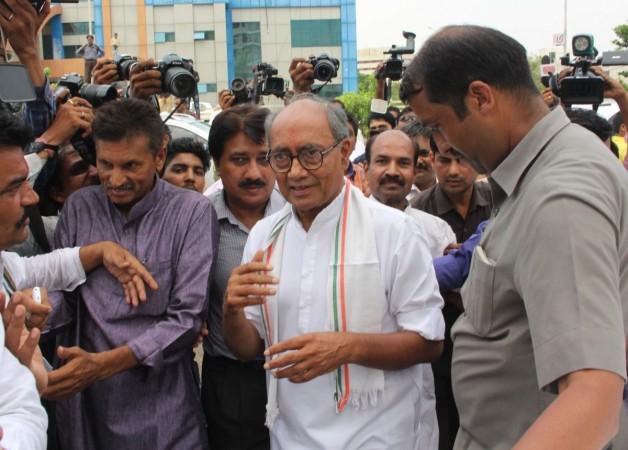
And how do you possibly respond gracefully to a seemingly hopeless question?
Instead the ever genial Digvijay Singh proceeds to rattle off to all present not just the man's antecedents. No that wouldn't be enough. He goes on to describe the individuals family history of political accomplishment.
You think that perhaps Singh got lucky with that one. But then again, over the course of the Bharat Jodo Yatra he does it enough times to know that the first one wasn't a fluke.
As the chairman of the Bharat Jodi Yatra committee, a razor sharp memory is only one of the among many attributes needed to pull off what's probably one of the most ambitious mass mobilisation program in the party's 135-plus-year history.
Says Vaibhav Walia, Secretary, Communication, and one of the key backroom boys in the party's media team, "Consider what it would take to lead an exercise of this nature- a five month, 3,500 kilometre long journey of tens of thousands of people through 12 Indian states, all the way from Kanyakumari to Kashmir And sometimes the audiences themselves number in the lakhs".
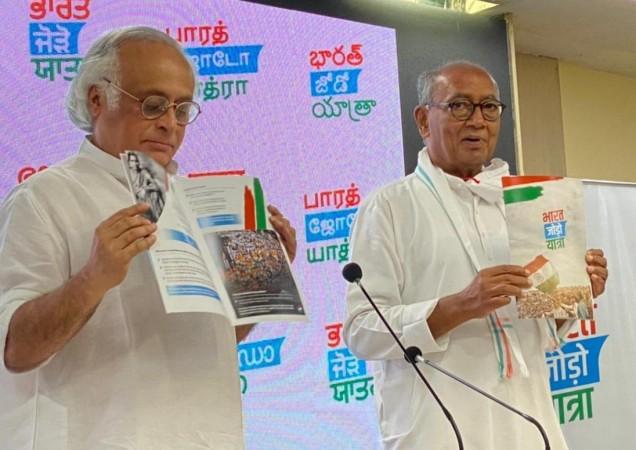
Insiders speak of the massive challenges in getting this exercise off the ground. The very first groups sceptics in fact emerged from within the party itself. Says " 'Why are we doing this now? Why are we following this route?' were some of the most common questions asked of us by party leaders", says Jairam Ramesh, Congress MP and General Secretary Communication. It was a formidable exercise in managing egos, expectations and ultimately, execution.
The sheer logistics behind the Yatra are mind boggling. Between a few hundreds to tens of thousands can accompany the yatris on a given day. There are another tens of thousands and sometimes lakhs lining the route, who're there to support the yatris or just watch. Thousands may require food and accommodation on a daily basis. Coordinating between the state and national Congress leadership, between departments as diverse as Route Planning, Crowd Management, Security, Catering (to name a few) is a daily challenge. And recycle and repeat that the next day, for 150 days.
"We were very lucky to have the Field Marshal" says Ramesh, using one of his favourite terms for Singh. Indeed, his lengthy history with the Congress party and his deep network of relationships with leaders across the country made him a great candidate to head the Bharat Jodo initiative. You see this, for instance, in an interaction with Chattisgarh Chief Minister Bhupesh Baghel who's leaving the yatra for his state. "Where are you off to Baghel ji", he gently jests. "I also have a state to run", replies Baghel.
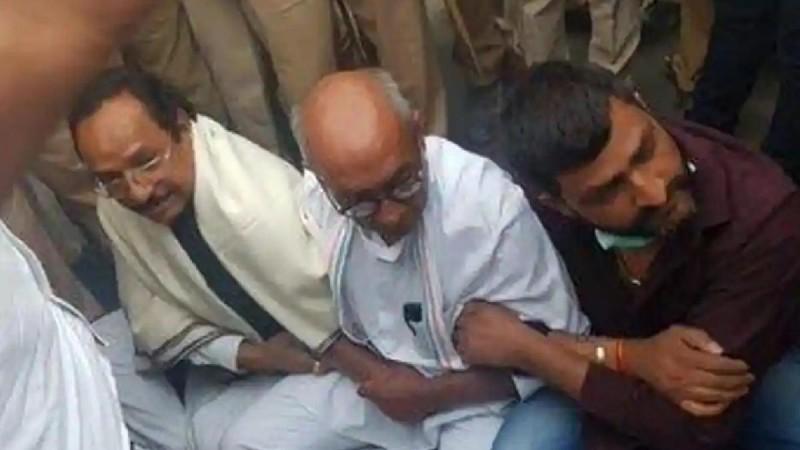
What sealed the deal was that back in 2017 and 2018, Singh led the Narmada Parikrama Yatra, a 3,300 kilometre walk along the banks of the river Narmada. In other words, he had considerable prior experience in a project of this scale.
It's not just that he's heading a project of incredible complexity but, at the age of 75, he's also involved in the arduous task of walking distances that would challenge anyone decades younger. Near the beginning of the yatra in September he'd responded to a question on his fitness by replying in jest, "I have to keep myself fit as I have a wife who is 23 years younger than me!"
But jests aside, his stamina has become a byword among the yatris, who're not quite sure how he manages it. I walked with him in Kerala and he kept pace with them, every step of the 14 kilometre morning walk, arriving at the end of the journey almost as composed as he began it (and, it may be noted, even as other yatris take to their beds, he rests on the floor at the end of it).
"Sometimes at the end of a day's walk I don't have the energy to get out of my bunk and walk 50 metres to have dinner" says Jyoti Rautela, yatri from Uttarakhand.
Favourite moment of Yatra
I catch up with him again on one of those long walks, just as the yatra enters Delhi less than two weeks ago, trying to get a better measure of the man. What has been his favourite moment of the yatra so far? "The start at the Gandhi mandapam" he says, referring to the memorial at Kanyakumari, where the Bharat Jodo Yatra commenced. Why is that? "Gandhji is an inspiration," he says. "He never aspired for anything."
What's been the most challenging moment? "That time in Karnataka, when it rained," he says referring back to when the rains almost blew out the yatri accommodations.
His answers readily, even pausing to engage with other yatris with affection and humour. An hour or so into our journey a yatri, while belting out a marching song, weaves his popular but jocular nickname "Diggy Raja" into the lyrics. The group dissolves into laughter while the man himself turns around in mock outrage, rises his hands and then laughs out loud himself.

But despite that million rupee smile and obvious warmth, you sense reserve, the feeling that this amiable man has underneath a steel wall hiding a very private core. He doesn't seem to like answering questions about himself, or at perhaps it's the freezing early morning cold, or perhaps I haven't established the proper rapport.
Ultimately it's not important to know someone through their words, when their actions will do just as well. You don't really get the measure of a man when he's comfortably sitting across the table from you in his expansive Delhi bungalow, 50 or more people hanging outside, some election ticket hopefuls, many just to have two words with Raja Saheb. You don't get to know him through his frequent and often combative tweets. You may not even know him over the course of a dozen private conversations over a few years.
But months into the Bharat Jodo Yatra, Digvijaya Singh has finally emerged into sharper focus for those who walk with him, more through what he does in private than what he says as a public personality.
He surprised many on Day 1 of the yatra at Trivandrum, when at 7 a.m. or so in the morning he was seen personally directing the yatris and even traffic, quite in the style of a sergeant major directing a company of troop. He doesn't need to do this himself.
Managing yatra throughout
A few days later, you see him standing at the gates of the yatra's midday rest camp. Again he's personally ensuring that of the hundreds of people of people struggling to get in under near stampede like conditions, the actual yatris are permitted inside. Again you think to yourself, why is he doing this himself?
Over the weeks and months that follow, it becomes a common pattern.
Consider these few conversations from internal groups.
"Dear Digvijaya ji" states a Yatri one evening in Kollam, Kerala, "Please be so good as to have atta rotis procured for us", "Eating maida rotis every day is making us ill".
"I'll get on it," says Raja Saheb, current Member of Parliament, former Chief Minister.
In another conversation, he is directing that a blanket on one bunk in one living room accommodation (space for 6) needs to be changed.
In an informal chat with yatris at the end of a day's journey in Trivandrum, he's advising people on the footwear to walk long distances.
He's personally handling individual yatri requests about toilet facilities ("Sir, the bathroom was locked at 3:30 AM when I needed to use it"), laundry facilities, drinking water problems, the list goes on. While also directing discussions on the order of the march, supply of medicines, issues relating to security, and so on.
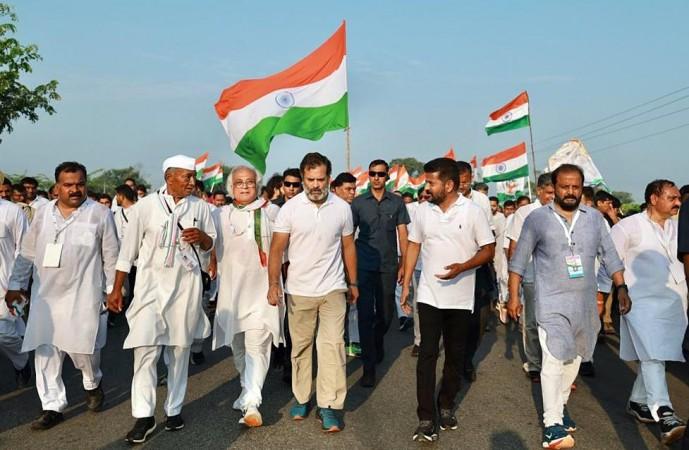
This is when it hits you. He's a National Figure, a Very Important Politician, and so on. He can easily very deputize all of these minor, day to day chores. While he himself can just have a few brief cheerleading sessions with the marchers, shake a few hands, move on. Get his face time with media.
It's 'normal', what you'd expect from a political heavyweight.
Instead he's getting personally involved in the daily, granular, exhausting tasks that would perhaps be considered demeaning by many leaders of his stature. Let's skip lightly over the fact that he's also walking long distances in the yatra.
Before we forget, the Bharat Yatris are all politicians themselves, as hard -nosed an audience as you can get. And they seem to instinctively understand that he cares. That's why they feel comfortable asking him to look at the 'maida' situation. Or the toilet situation.
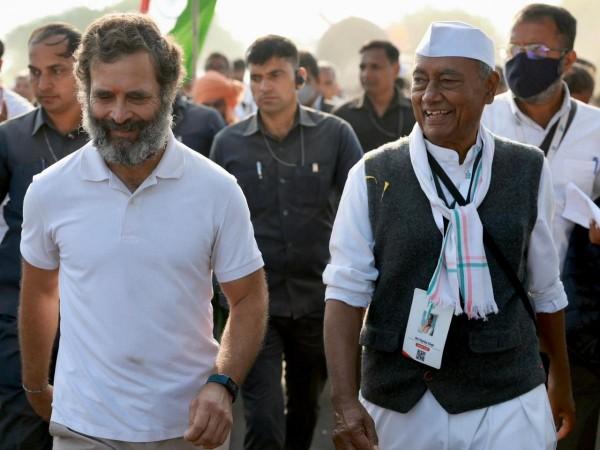
And you know that when you get up at 4:30 a.m., tired and ready to start yet another day in the yatra, the yatris will find a WhatsApp message waiting for them from Digvijay Singh, written in the early hours, that's reassuring, problem solving, informing, and encouraging.
Mostly out of sight of the media, to an audience that numbers perhaps less than a hundred and fifty, over a gruelling, mentally and physically draining five months, the Field Marshal is giving a masterclass in quiet leadership. And that's enough to know the man.
[DISCLAIMER: The views expressed are author's personal and do not reflect the policy or views of the IB Times, India.]
Related








